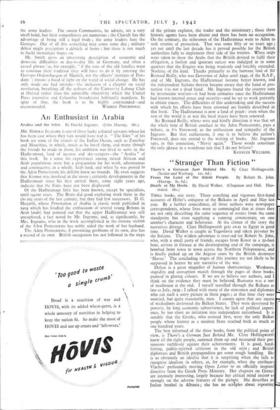An Enthusiast in Arabia
Arabia and the Isles. By Harold Ingrams. (John Murray, as.)
MR. HAROLD IN:iliams is one of those lucky colonial servants whose lot has been cast where they fain would have had it. The Isles" of his book are some of the islands of the Indian Ocean, such as Zanzibar and Mauritius, in which, much as he loved them, and many though the friends he made in them, his ambition was fired to serve in the Hadhramaut, land of incense and sky-scrapers—the " Arabia " of this book. In a sense his experiences among mixed African and Arab populations were but a preparation for his work, adventurous and constructive, in a wholly Arab land, and when he was posted to the Aden Protectorate his delight knew no bounds. He even suggests that Kismet was involved in the move ; certainly developments in the Hadhramaut since his first arrival there, some eight years ago, indicate that the Fates have not been displeased.
Of the Hadhramaut litt!e has been known, except by specialists, until regent years. The Bents did good exploring work there in the closing years of the last century, but they had few successors. D. G. Hogarth, whose Penetration of Arabia (a classic work published in 1904 which has kindled the enthusiasm of several young Britons in Arab lands) had pointed out that the upper Hadhramaut was still unexplored, a fact noted by Mr. Ingrams, and, as significantly, by Mrs. Ingrams, who in the work accomplished in the eastern section of the Aden Protectorate has nobly aided the work of her husband.
The Aden Protectorate, if presenting problems of its own, also has a record of its own. British occupation has not followed in the steps of the private explorer, the trader and the missionary ; those three historic agents have been absent and there has been no occupation. On the contrary, the tribesmen of the Hadhramaut went to Aden to seek treaties of protection. That was some fifty or so years ago ; yet not until the last decade has it proved possible -for the British authorities fully to implement their side of the treaties. When steps were taken to show the Arabs that the British desired to fulfil their obligation, a foolish and ignorant outcry was indulged in in some quarters that the Empire was being wantonly and forcibly extended. Nothing of the kind. Thanks primarily to the humane lead of Sir Bernard Reilly, who was Governor of Aden until 1940, of the R.A.F., and of Mr. Ingrams, the Hadhramaut became better known, and the independent Sultans therein became aware that the hand of pro- tection was not a dead hand. Mr. Ingrams found the country torn by internecine warfare—it had been centuries since the Hadhramaut had known internal peace and security—and he set to work patiently to obtain truces. The difficulties of this undertaking and the success with which his efforts have been crowned are frankly described in this book. The Hadhramaut is now a land of peace : even when the rest of the world is at war the local truces have been renewed.
Sir Bernard Reilly, whose wise and kindly direction it was that set the whole tone of British conduct in the Aden Protectorate, pays a tribute, in his Foreword, to the enthusiasm and sympathy of the Ingrams. But that enthusiasm, if one is to believe the author's Foreword, does not extend to the writing of books. Mr. Ingrams says, in this connexion, "Never again." Those words constitute the only phrase in a wondrous tale that I do not believe!
KENNETH WILLIAMS.


























 Previous page
Previous page